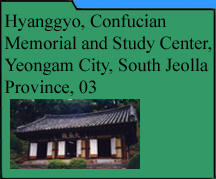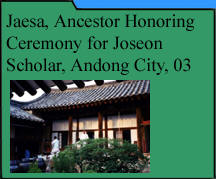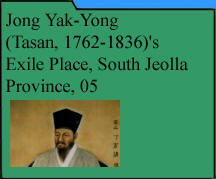back to
Gallery Mainpage
Confucianism in Korea
Confucianism traces its origin to the teachings of the Chinese
philosopher, K'ung-fu-tzu (Anglicized as Confucius) who lived
about 551-479 BCE. Confucius taught principles to reform
individuals and society and criticized the misuse of political
power. He looked back to legendary sage-kings, such as Yao and
Shun (prior to 2200 BCE), and other virtuous and wise people as
examples of the benevolent way to organize society and govern
for the benefit of all people. Meng-tzu (Mencius, 372-289 BCE)
was the second greatly influential teacher in this tradition.
He severely criticized corrupt
governance and promoted a Royal Path of virtue.
During the Han dynasty of China (206 BCE-8 CE),
Confucianism was adopted as the state ideology. Over the
centuries it spread throughout East and Southeast Asia to have a
tremendous impact on institutions of government and education as
well as social ethics and family life. Confucianism especially
promotes the ideal of the scholar, who cultivates virtue in
oneself and shares it through service in government, teaching,
and daily life to benefit all people in rippling effects from
family to the wider society to the world. Confucianism also
influenced the development of meditation, martial arts, and
herbal and acupuncture systems designed to promote health
through moral cultivation and balanced life energy (ch'i).
The photos in this section are from my research travels in
Korea. Confucianism has strongly influenced Korean culture for
about 2000 years. During the Joseon dynasty (1392-1910),
Neo-Confucianism was the state ideology. The photos illustrate
ceremonies, study centers, shrines, and burial places that
commemorate great scholars, kings, and generals. This reflects
the Confucian appreciation for heritage and wise teachers and
public servants. For example, Great King Sejong (r. 1418-50)
organized many efforts to benefit social welfare through
technological inventions, creation of the Korean alphabet to
promote literacy, and renovation of music and arts. Jo Gwang-Jo
(16th century) was a scholar who advocated that government
should exist for the welfare of people rather than
aggrandizement of rulers. He was forced to drink lethal poison
by the king due to false accusations by slanderous rivals. His
last words, as inscribed on a memorial stone near his grave,
were:
I loved the king
as my father.
I worried about
the country as my home.
The white sun
descended on this land
And shown
brightly on my red heart.
You will also find here a wide range of other Confucian
themes, such as appreciation for the ginkgo tree (Confucius
liked to teach under its branches) and honoring the virtue of
filial piety (that is, respecting parents, elders, and
ancestors).


